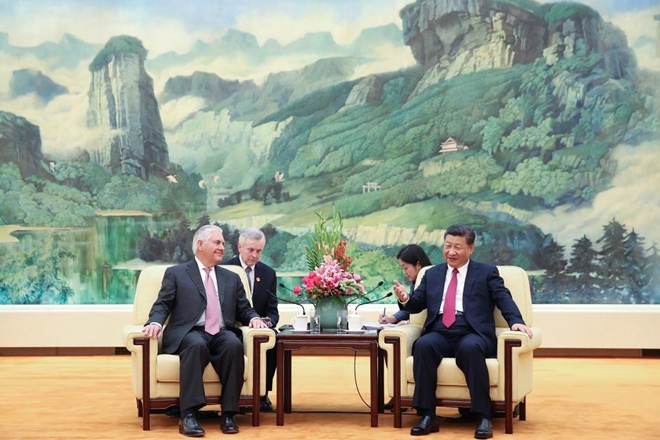U.S. directly communicating with North Korea, seeks dialogue
 |
| U.S. Secretary of State Rex Tillerson (L) meets with Chinese President Xi Jinping (R) at the Great Hall of the People in Beijing, China September 30, 2017. REUTERS |
The disclosure by U.S. Secretary of State Rex Tillerson during a trip to China represented the first time he has spoken to such an extent about U.S. outreach to North Korea over its pursuit of a nuclear-tipped intercontinental ballistic missile.
“We are probing so stay tuned,” Tillerson told a group of reporters in Beijing.
“We ask: ‘Would you like to talk?’ We have lines of communications to Pyongyang. We’re not in a dark situation, a blackout.”
He said that communication was happening directly and cited two or three U.S. channels open to Pyongyang.
“We can talk to them. We do talk to them,” he said, without elaborating about which Americans were involved in those contacts or how frequent or substantive they were.
The goal of any initial dialogue would be simple: finding out directly from North Korea what it wants to discuss.
“We haven’t even gotten that far yet,” he said.
Trying to tamp down expectations, the State Department said later there were no signs Pyongyang was interested in talks.
“North Korean officials have shown no indication that they are interested in or are ready for talks regarding denuclearization,” department spokeswoman Heather Nauert said in a statement.
Tillerson previously had offered little detail about U.S. outreach. On Sept. 20, he acknowledged only “very, very limited” contact with Pyongyang’s U.N. envoy.
When asked about Tillerson’s assertion and what communication there might be between Pyongyang and Washington, a spokesman for the North Korean mission to the United Nations said he “can’t go further into detail.”
OVERHEATED SITUATION
Tillerson’s remarks followed a day of meetings in Beijing, which has been alarmed by recent exchanges of war-like threats and personal insults between North Korean leader Kim Jong Un and U.S. President Donald Trump.
”I think the whole situation’s a bit overheated right now,“ Tillerson said. ”I think everyone would like for it to calm down.
“Obviously it would help if North Korea would stop firing off missiles. That’d calm things down a lot.”
South Korean officials have voiced concerns that North Korea could conduct more provocative acts near the anniversary of the founding of its communist party on Oct. 10, or possibly when China holds its Communist Party Congress on Oct. 18.
North Korea is fast advancing toward its goal of developing a nuclear-tipped missile capable of hitting the U.S. mainland. It conducted its sixth and largest nuclear test on Sept. 3 and has threatened to test a hydrogen bomb over the Pacific.

